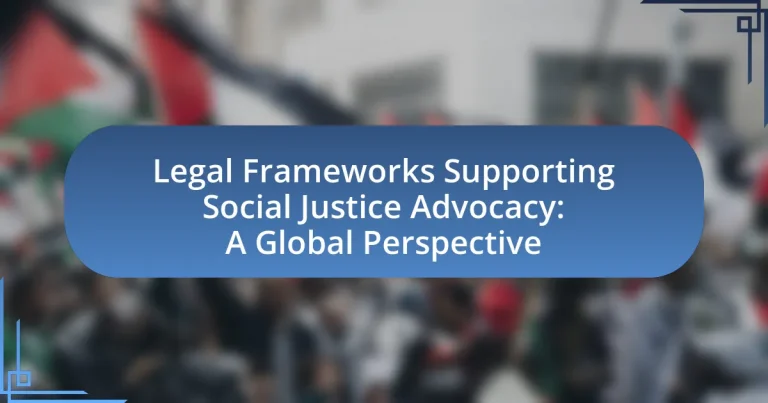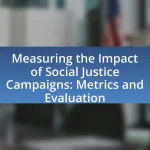Legal frameworks supporting social justice advocacy encompass international human rights treaties, national constitutions, and specific legislation aimed at protecting marginalized groups. This article examines the variations in these frameworks across different countries, highlighting key components such as equality, non-discrimination, and access to justice. It also explores the influence of cultural contexts on legal systems, the essential role of legal frameworks in protecting marginalized communities, and the challenges faced in their implementation. Additionally, the article discusses major international legal instruments, regional frameworks, and effective advocacy strategies that can enhance social justice efforts globally.
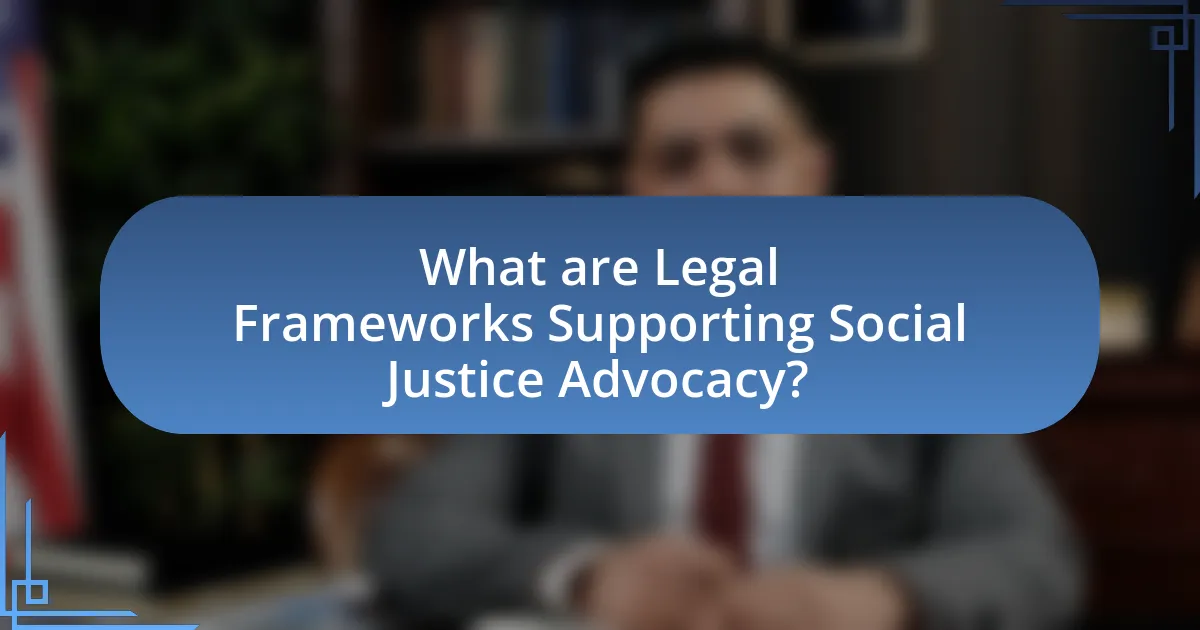
What are Legal Frameworks Supporting Social Justice Advocacy?
Legal frameworks supporting social justice advocacy include international human rights treaties, national constitutions, and specific legislation aimed at protecting marginalized groups. For instance, the Universal Declaration of Human Rights establishes fundamental rights that all individuals are entitled to, serving as a cornerstone for social justice advocacy globally. Additionally, national laws such as the Civil Rights Act in the United States prohibit discrimination based on race, color, religion, sex, or national origin, reinforcing the legal basis for social justice initiatives. These frameworks provide the necessary legal tools for advocates to challenge injustices and promote equality, ensuring that social justice efforts are grounded in enforceable rights and protections.
How do these legal frameworks vary across different countries?
Legal frameworks supporting social justice advocacy vary significantly across countries due to differences in legal traditions, cultural values, and political systems. For instance, countries like Sweden and Norway have comprehensive legal protections for social justice, including strong anti-discrimination laws and robust welfare systems, reflecting their commitment to equality and social welfare. In contrast, nations such as the United States have a more fragmented approach, where social justice laws can vary widely by state, leading to inconsistencies in protections and advocacy efforts. Furthermore, countries with authoritarian regimes, like North Korea, often lack legal frameworks that support social justice, as dissent and advocacy are suppressed. These variations are influenced by historical contexts, such as colonial legacies in African nations, which have shaped their current legal systems and social justice frameworks.
What are the key components of social justice legal frameworks globally?
The key components of social justice legal frameworks globally include equality, non-discrimination, access to justice, and the protection of human rights. Equality ensures that all individuals have the same legal rights and opportunities, while non-discrimination prohibits unfair treatment based on characteristics such as race, gender, or socioeconomic status. Access to justice guarantees that individuals can seek legal remedies and participate in legal processes without barriers. The protection of human rights encompasses various international treaties and conventions, such as the Universal Declaration of Human Rights, which provide a foundation for social justice by affirming the dignity and rights of all people. These components collectively aim to create a fair and just society, addressing systemic inequalities and promoting the well-being of marginalized groups.
How do cultural contexts influence these legal frameworks?
Cultural contexts significantly influence legal frameworks by shaping societal values, norms, and expectations that inform the creation and interpretation of laws. For instance, in countries where collectivist cultures prevail, legal systems may prioritize community rights over individual rights, as seen in many Indigenous legal traditions that emphasize communal land ownership. Additionally, cultural attitudes towards gender roles can affect laws related to gender equality; in some societies, traditional views may hinder the implementation of progressive gender legislation. This influence is evident in the varying degrees of legal protections for marginalized groups across different nations, reflecting the unique cultural landscapes that inform these frameworks.
Why are legal frameworks essential for social justice advocacy?
Legal frameworks are essential for social justice advocacy because they provide the necessary structure and legitimacy for enforcing rights and addressing injustices. These frameworks establish legal standards that protect marginalized groups, ensuring accountability for violations and facilitating access to justice. For instance, international human rights treaties, such as the Universal Declaration of Human Rights, set binding obligations for states to uphold fundamental rights, thereby empowering advocates to challenge discriminatory practices. Additionally, legal frameworks enable the creation of mechanisms for redress, such as courts and tribunals, which are crucial for enforcing social justice initiatives and promoting equitable treatment in society.
What role do legal frameworks play in protecting marginalized communities?
Legal frameworks play a crucial role in protecting marginalized communities by establishing rights and providing mechanisms for redress against discrimination and injustice. These frameworks, such as anti-discrimination laws and human rights treaties, create legal obligations for governments to uphold the rights of vulnerable groups, ensuring access to justice and equality. For instance, the United Nations Declaration on the Rights of Indigenous Peoples outlines specific protections for indigenous communities, mandating states to respect their rights to land, culture, and self-determination. Additionally, legal frameworks can empower marginalized groups by enabling them to challenge injustices in courts, as seen in landmark cases like Brown v. Board of Education, which dismantled racial segregation in the United States. Thus, legal frameworks serve as essential tools for advocacy and protection, fostering social justice and equity for marginalized populations.
How do legal frameworks facilitate social change?
Legal frameworks facilitate social change by establishing rules and norms that govern behavior, thereby influencing societal values and practices. For instance, the enactment of civil rights legislation in the United States, such as the Civil Rights Act of 1964, legally prohibited discrimination based on race, color, religion, sex, or national origin, which significantly advanced social equality. This legal change prompted shifts in public attitudes and behaviors, demonstrating how laws can drive societal transformation by providing a formal mechanism for enforcing rights and promoting justice.
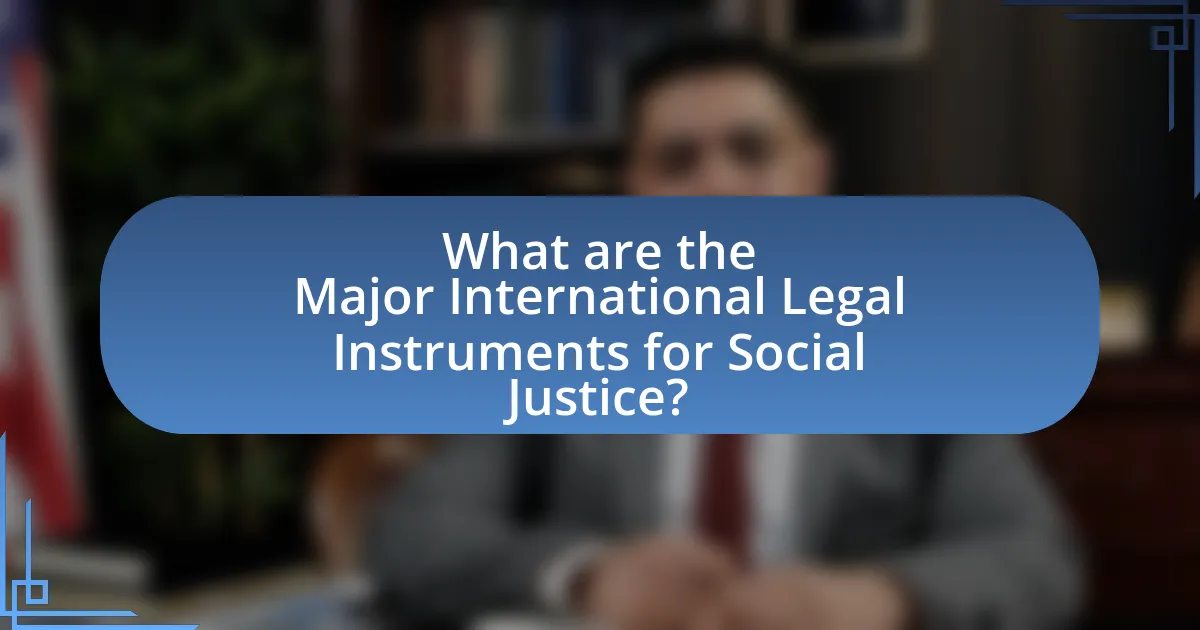
What are the Major International Legal Instruments for Social Justice?
The major international legal instruments for social justice include the Universal Declaration of Human Rights (UDHR), the International Covenant on Civil and Political Rights (ICCPR), and the International Covenant on Economic, Social and Cultural Rights (ICESCR). The UDHR, adopted by the United Nations General Assembly in 1948, establishes fundamental human rights that are universally protected. The ICCPR, adopted in 1966, focuses on civil and political rights, ensuring individuals’ rights to freedom of expression, assembly, and fair trial. The ICESCR, also adopted in 1966, emphasizes economic, social, and cultural rights, including the right to work, education, and an adequate standard of living. These instruments collectively provide a comprehensive framework for promoting and protecting social justice globally.
How do international treaties support social justice advocacy?
International treaties support social justice advocacy by establishing binding legal standards that promote human rights and equality across nations. These treaties, such as the International Covenant on Civil and Political Rights and the Convention on the Elimination of All Forms of Discrimination Against Women, create frameworks that obligate signatory countries to uphold and protect the rights of marginalized groups. For instance, the Convention on the Rights of Persons with Disabilities mandates states to ensure accessibility and inclusion for individuals with disabilities, thereby directly advancing social justice. By holding countries accountable to these international norms, treaties empower advocates to challenge injustices and demand compliance, fostering a global culture of respect for human rights and social equity.
What are the most significant treaties related to social justice?
The most significant treaties related to social justice include the Universal Declaration of Human Rights (1948), the International Covenant on Civil and Political Rights (1966), and the International Covenant on Economic, Social and Cultural Rights (1966). The Universal Declaration of Human Rights establishes fundamental human rights that are universally protected, while the International Covenant on Civil and Political Rights focuses on protecting individual rights and freedoms, including the right to equality and non-discrimination. The International Covenant on Economic, Social and Cultural Rights emphasizes the importance of social justice by recognizing rights related to work, education, and an adequate standard of living. These treaties collectively form a foundational legal framework that supports social justice advocacy globally.
How do these treaties impact national laws?
Treaties significantly influence national laws by establishing binding obligations that countries must incorporate into their domestic legal frameworks. For instance, international human rights treaties, such as the International Covenant on Civil and Political Rights, require signatory states to align their laws with the treaty’s provisions, thereby enhancing protections for individual rights. This alignment often leads to legislative reforms, judicial interpretations, and policy changes that reflect the treaty’s standards, ensuring that national laws uphold international commitments.
What role do regional legal frameworks play in social justice?
Regional legal frameworks play a crucial role in advancing social justice by establishing laws and policies that protect the rights of marginalized communities. These frameworks provide a legal basis for addressing inequalities and discrimination, enabling individuals and groups to seek redress through judicial systems. For instance, the African Charter on Human and Peoples’ Rights promotes social justice by safeguarding economic, social, and cultural rights, which are essential for equitable development. Additionally, regional frameworks often facilitate collaboration among member states to address transnational issues such as human trafficking and environmental justice, thereby enhancing collective efforts toward social equity.
How do regional human rights instruments differ from international ones?
Regional human rights instruments differ from international ones primarily in their scope and enforcement mechanisms. Regional instruments, such as the European Convention on Human Rights or the African Charter on Human and Peoples’ Rights, are tailored to specific geographic areas and often reflect the cultural, historical, and social contexts of those regions. In contrast, international human rights instruments, like the Universal Declaration of Human Rights, apply universally across all nations and are designed to establish a common standard of rights.
Additionally, regional instruments typically have established bodies for monitoring compliance and adjudicating violations, such as the European Court of Human Rights, which can issue binding decisions on member states. International instruments, however, often rely on voluntary compliance and lack direct enforcement mechanisms, making regional frameworks more effective in certain contexts. This distinction highlights the importance of regional specificity in addressing human rights issues while also illustrating the limitations of broader international agreements.
What examples illustrate the effectiveness of regional frameworks?
Regional frameworks effectively promote social justice through various examples. The African Charter on Human and Peoples’ Rights, adopted in 1986, illustrates this by providing a comprehensive framework for the protection of human rights across African nations, leading to increased accountability and advocacy for marginalized groups. Similarly, the European Convention on Human Rights has facilitated numerous landmark rulings by the European Court of Human Rights, reinforcing protections for individuals against state abuses and promoting equality. These frameworks demonstrate their effectiveness by fostering regional cooperation, enhancing legal standards, and empowering civil society organizations to advocate for social justice.
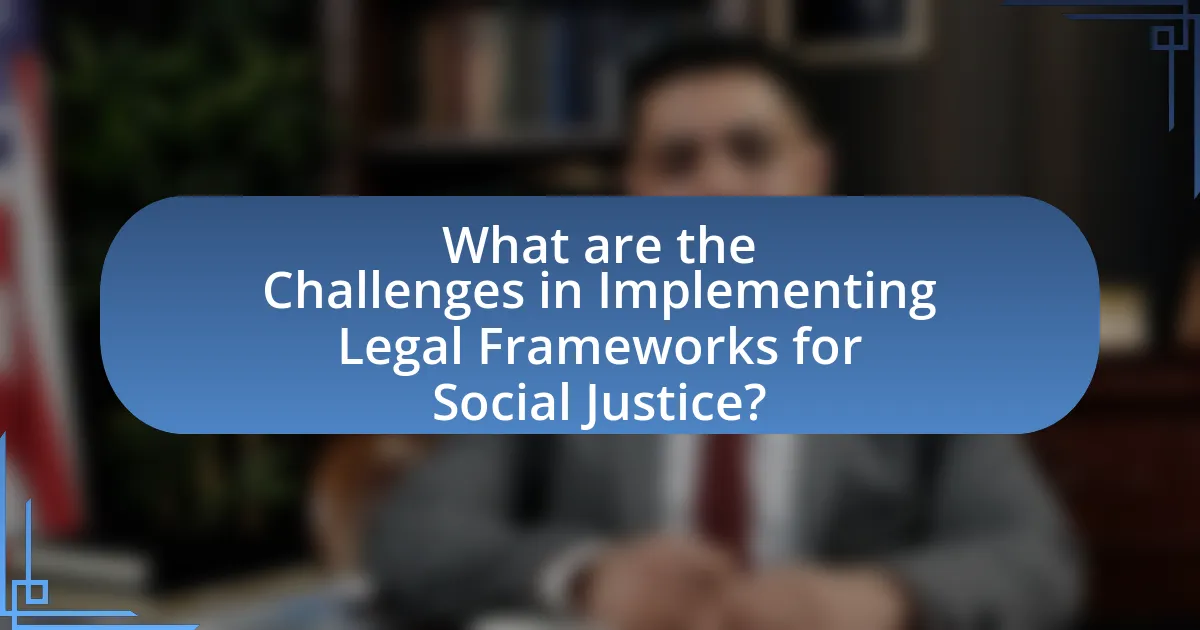
What are the Challenges in Implementing Legal Frameworks for Social Justice?
The challenges in implementing legal frameworks for social justice include inadequate resources, lack of political will, and systemic discrimination. In many regions, insufficient funding and personnel hinder the effective enforcement of laws designed to promote social justice, as evidenced by the United Nations Development Programme’s report indicating that over 70% of countries lack adequate legal aid services. Additionally, political resistance often arises from those benefiting from existing inequalities, which can stall or reverse progress, as seen in various countries where reforms face significant opposition. Systemic discrimination, including biases based on race, gender, and socioeconomic status, further complicates the application of legal frameworks, leading to unequal access to justice and perpetuating existing disparities.
What barriers hinder the effectiveness of these legal frameworks?
Barriers that hinder the effectiveness of legal frameworks supporting social justice advocacy include inadequate enforcement mechanisms, lack of resources, and insufficient public awareness. Inadequate enforcement mechanisms result in laws that exist on paper but are not implemented effectively, leading to a gap between legal rights and actual protections. For instance, a study by the United Nations Development Programme highlights that many countries lack the institutional capacity to enforce laws related to social justice, which diminishes their impact. Additionally, lack of resources, both financial and human, limits the ability of organizations to advocate for and utilize these legal frameworks effectively. Furthermore, insufficient public awareness about existing legal rights prevents marginalized communities from accessing the protections intended for them, as evidenced by surveys indicating low levels of knowledge regarding legal rights among vulnerable populations.
How do political climates affect the enforcement of social justice laws?
Political climates significantly influence the enforcement of social justice laws by determining the priorities and resources allocated to these laws. In democratic societies, a supportive political climate often leads to robust enforcement mechanisms, as seen in countries like Canada, where progressive governments have actively promoted human rights legislation. Conversely, in authoritarian regimes, social justice laws may be undermined or ignored, as evidenced by the suppression of dissent in countries like Belarus, where the government restricts civil liberties and limits the application of social justice principles. This correlation between political climate and law enforcement is further supported by research indicating that political will is crucial for the implementation of social justice initiatives, as highlighted in the 2020 report by the United Nations Development Programme, which emphasizes that effective governance is essential for upholding social justice.
What are the common legal loopholes that undermine social justice?
Common legal loopholes that undermine social justice include vague legislation, inadequate enforcement mechanisms, and exemptions for certain groups. Vague legislation allows for broad interpretation, which can lead to discriminatory practices. For instance, laws that lack clear definitions can be manipulated to favor specific demographics, thereby perpetuating inequality. Inadequate enforcement mechanisms often result in a lack of accountability for violations, as seen in cases where regulatory bodies fail to act against discriminatory practices in employment or housing. Additionally, exemptions for certain groups, such as religious organizations or non-profits, can create disparities in legal protections, allowing them to bypass regulations that promote social equity. These loopholes collectively hinder the effectiveness of legal frameworks designed to support social justice.
How can advocacy groups overcome these challenges?
Advocacy groups can overcome challenges by leveraging legal frameworks that support social justice initiatives. These frameworks provide essential protections and resources that empower advocacy efforts. For instance, international human rights treaties, such as the International Covenant on Civil and Political Rights, establish legal standards that advocacy groups can use to hold governments accountable. Additionally, effective collaboration with legal experts can enhance the capacity of advocacy groups to navigate complex legal landscapes, ensuring compliance and maximizing impact. Research indicates that advocacy groups that utilize legal strategies, such as litigation and policy advocacy, can achieve significant reforms, as evidenced by successful cases in various jurisdictions where legal action led to changes in discriminatory laws.
What strategies have proven successful in advocating for legal reforms?
Successful strategies for advocating legal reforms include grassroots mobilization, coalition building, and strategic litigation. Grassroots mobilization engages communities directly, fostering public support and awareness, as seen in movements like the Civil Rights Movement in the United States, which effectively utilized local activism to drive national change. Coalition building among diverse stakeholders, such as NGOs, legal experts, and affected communities, enhances the advocacy effort’s reach and impact, exemplified by the collaboration seen in the global climate justice movement. Strategic litigation leverages the judicial system to challenge unjust laws and practices, with landmark cases like Brown v. Board of Education demonstrating how legal challenges can lead to significant reforms in civil rights. These strategies collectively create a robust framework for effective advocacy in legal reform efforts.
How can collaboration between organizations enhance advocacy efforts?
Collaboration between organizations enhances advocacy efforts by pooling resources, expertise, and networks to amplify their collective impact. When organizations work together, they can share knowledge and best practices, leading to more effective strategies and campaigns. For instance, a study by the Stanford Social Innovation Review found that collaborative advocacy initiatives can increase the likelihood of achieving policy changes by up to 50%. This is due to the combined influence of diverse stakeholders, which can lead to greater visibility and credibility in the eyes of policymakers and the public.
What best practices can be adopted for effective social justice advocacy?
Effective social justice advocacy can be achieved through several best practices, including building coalitions, utilizing data-driven strategies, and engaging in community education. Building coalitions allows diverse groups to unite, amplifying their voices and resources, which is essential for impactful advocacy. Data-driven strategies, such as employing statistics and research to support claims, enhance credibility and inform policy decisions; for instance, the use of demographic data can highlight disparities in access to resources. Engaging in community education empowers individuals with knowledge about their rights and the legal frameworks that support social justice, fostering grassroots movements that can drive systemic change.
How can legal education empower advocates in their efforts?
Legal education empowers advocates by equipping them with essential knowledge of laws, legal principles, and advocacy skills necessary for effective representation. This education fosters critical thinking, enabling advocates to analyze complex legal issues and develop strategic approaches to social justice cases. Furthermore, legal education often includes practical training through clinics and internships, which provide real-world experience in navigating legal systems and understanding client needs. Studies show that law graduates who participate in experiential learning programs are more adept at advocating for marginalized communities, as they gain firsthand insight into the challenges these groups face within the legal framework.
What role does community engagement play in successful advocacy?
Community engagement is crucial for successful advocacy as it fosters trust, mobilizes support, and amplifies voices within the community. Engaged communities are more likely to participate actively in advocacy efforts, leading to increased visibility and impact of the issues at hand. Research indicates that advocacy initiatives that incorporate community input and participation are 50% more effective in achieving policy changes compared to those that do not engage the community. This is evidenced by the success of grassroots movements, which often rely on community involvement to drive change and influence decision-makers.
